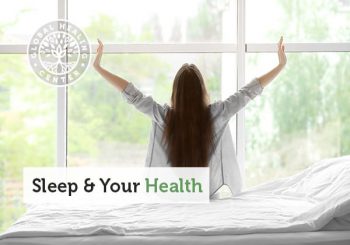Guest Writer for Wake Up World
Roughly one in three adults in the United States do not get enough sleep.[1] That means that 33 percent of adults are regularly getting less than seven hours of shut-eye each night. Getting enough sleep is important to virtually every aspect of your health, from brain health to immune system function to body metabolism. Scientists believe that your nightly rest even clears “cobwebs” in the brain — metaphorically, of course — by removing toxic waste byproducts.[2] Word to the wise: get enough sleep if you want to think clearly and perform your best!
[pro_ad_display_adzone id=”110028″]
How Important Is Sleep?
Getting enough sleep is critical for keeping your body and mind functioning at their best. It also allows the body and brain to rest, repair, and recharge. Adults need at least seven to nine hours of sleep each night, according to the U.S. Centers for Disease Control and Prevention (CDC).[3] While sleeping, your body calms, your breathing and heart rate slow down, and your brain enters a state of altered consciousness.
The Four Stages of Sleep
One of the reasons the CDC recommends seven to nine hours each night is so that you can experience all four stages of sleep — three stages of non-REM (rapid eye movement) sleep, plus REM sleep, during which you dream.
Non-REM Sleep
Stage 1: During the first stage of non-REM sleep, your body transitions from being awake to being asleep. The duration of this phase of sleep is short — typically only a few minutes — and you are in a relatively light sleep from which you can be easily awoken.
Stage 2: In the second stage, your body fully relaxes. Your breathing, heart rate, and brain activity slow down, but your sleep is still light.
Stage 3: In the third stage, you enter deep sleep. It may be difficult for others to wake you up during this stage. This deep sleep helps you feel rejuvenated when you wake up in the morning.
REM Sleep
Stage 4: REM sleep, stage four, is the stage in which you dream. During REM sleep, your heart rate and brain activity increase, becoming similar to when you’re awake. Your breathing speeds up, too, though it may become irregular. The older you are, the less of your sleep time you will spend in REM sleep. The first round of REM sleep happens within 90 minutes of falling asleep and will occur at least one if not more times during a typical night’s rest. Stage four makes up 25 percent of your sleep cycle.[2, 4]
The Health Benefits of Sleep
So just how important is sleep? Here are a few ways your body benefits from being well-rested.
Improved Concentration
Getting enough sleep is critical for optimal concentration, attention, and problem-solving. When you’re feeling drowsy, you have a harder time paying attention and your memory suffers. Sleep deprivation can impair both working and long-term memory. It also negatively impacts attention and decision-making skills.[5] If you change your sleep habits to get adequate sleep, it can help boost your performance at work or school.
Improved Immune System
Getting enough sleep will help ensure that your immune system operates at full capacity, helping you to keep the common cold and flu at bay. Although it’s not yet clear how sleep patterns affect any individual’s health, more and more studies are finding a strong link between lack of sleep and disease patterns over the long term.[5] Sleeping isn’t just good medicine when you’re sick — it’s also a great tool for prevention. Sleep reduces inflammation and helps restore health through many different mechanisms. Adequate sleep reduces your risk of infectious diseases and is simply one of the best promoters of physical and mental health.[6, 7]
Improved Athletic Performance
Getting enough sleep also helps you perform better at sports. Athletes who get enough sleep have faster reaction times than those who don’t. In contrast, being awake for 22 hours affects reaction time even more than four alcoholic drinks.[8] Being well-rested is a key part of playing at the top of your game. Sleep gives your muscles and other tissues time to regenerate and repair after grueling training sessions or games. Without this key time for rest and repair, your body can’t consolidate the gains you’ve made — and you’re more likely to injure yourself in the future.
Improved Metabolism
Getting adequate sleep boosts your metabolism, and the opposite is also true — not getting enough sleep may decrease your metabolic rate. When you’re sleep-deprived, your body produces more of the stress hormone cortisol, which slows your metabolism and causes your body to store more fat. When you get enough sleep, your metabolism increases, in part by ensuring a proper balance between two important hormones in the body: ghrelin (the hormones that tell your body it’s hungry) and leptin (the hormone that tells your body it’s full). One study found that people who were sleep-deprived had 16 percent less leptin and 15 percent more ghrelin compared to those who had had a sufficient amount of sleep.[9]
How Much Sleep Do We Need?
The amount of sleep you need varies with your age. Below is a table of the amount of sleep the CDC recommends per day for the different age groups.[10]
| Age | Recommended Hours of Sleep per Day |
|---|---|
| Newborn (0 – 3 months) | 14 – 17 hours |
| Infant (4 – 12 months) | 12 – 16 hours |
| Toddler (1 – 2 years) | 11 – 14 hours |
| Preschooler (3 – 5 years) | 10 – 13 hours |
| School-Aged Kids (6 – 12 years) | 9 – 12 hours |
| Teenagers (13 – 17 years) | 8 – 10 hours |
| Adults (18 – 64 years) | 7 – 9 hours |
| Adults (65+) | 7 – 8 hours |
Signs of Sleep Deprivation
How can you tell if you’re sleep-deprived? Here are three common clues:
Fatigue
While not all daytime fatigue is a result of poor sleep, being sleep-deprived often leads you to feel tired during the day. If you’re experiencing significant daytime fatigue, try to increase the amount you sleep each night and see if your excess tiredness diminishes and your energy increases.
Mood Swings
If you’re feeling moody and irritable for no reason, you may be sleep-deprived. Again, focus on getting adequate sleep and see if your mood improves. Check out our article on herbs for controlling mood swings.
Difficulty Concentrating
Having trouble focusing on work or school could indicate that you need more sleep. It’s hard to maintain your focus when you’re sleep-deprived. Try getting more sleep to see if your concentration improves.
How Sleep Deprivation Impacts Your Health
Sleep deprivation can have many unwanted impacts on your life and health. On a day-to-day basis, feeling drained before the day even starts is limiting in every way. From a big-picture perspective, sleep deprivation can lead to weight gain and obesity, heart disease, high blood pressure, stroke, and depression.
Obesity & Weight Gain
Multiple studies have linked obesity and insufficient sleep.[11] There are many reasons why sleep-deprived people tend to weigh more, including having more hours to eat and not having the energy to exercise. Insufficient sleep increases the hormone that makes us feel hungry (ghrelin) and decreases the hormone that makes us feel full (leptin).
Diabetes & Metabolic Syndrome
Being sleep-deprived can also increase your risk of getting adult-onset diabetes. Just one night of sleep deprivation (four hours of sleep or less) can increase insulin resistance.[12] When your body’s cells become insulin-resistant, blood sugar levels rise, which, in turn, increases your risk of developing diabetes.
Heart Disease, High Blood Pressure & Stroke
Not getting enough sleep is linked to increased risk of heart disease, high blood pressure, and stroke.[13] It can be a vicious cycle, too. High blood pressure is a risk factor for sleep apnea — a sleep disorder in which you temporarily stop breathing during the night. Since sleep apnea further disrupts your sleep, it can exacerbate your risk of cardiovascular disease. Untreated sleep apnea — whatever the cause — is a risk factor for heart disease, high blood pressure, and stroke.
Depression
Lack of sleep doesn’t just impact your physical health, it also affects your mental health and emotions. Even one night of inadequate sleep can cause people to feel irritable and prone to mood swings.[6] Studies indicate that insomnia is common among people suffering from depression.[14] Experts believe that sleep deprivation may provoke mental health issues, including depression or anxiety.
Tips to Get a Good Night’s Sleep
Sometimes getting a good night’s sleep is easier said than done. Many people who don’t sleep well also struggle to perform throughout the day. Whether you have trouble falling asleep or staying asleep, there are natural remedies to help, from sleeping naked to using lavender oil to relax.
Go to Bed Early & On Schedule
Getting plenty of uninterrupted, restful sleep is the only way to ensure that you’re not sleep-deprived. Make sure you have at least eight hours between the time you turn the lights off and when you need to get up in the morning. Also, make yourself go to sleep at the same time each night so your body gets on a schedule.
Set the Alarm to Wake You Early
You need to wake up early enough in the morning to feel sleepy at an appropriate time at night. If you wake too late in the day, your body will have trouble falling asleep at bedtime. Getting up on time also ensures that you have time for breakfast, which can be essential for boosting your energy after a night of sleep.[15]
Get Early-Morning Sunlight
By aligning your sleep/wake cycle with the sun, you’ll have an easier time falling asleep — and staying asleep — once it’s dark. That’s because melatonin, the hormone that helps us sleep, is secreted in darkness and suppressed by light.
Get Enough Exercise
You should aim for at least 30 minutes of activity daily, ideally outside. Exercise helps you sleep better by reducing stress and leading your body to feel more physically tired by the end of the day. In addition, exercising outside during daylight hours will help set your biological clock.
Turn Off the Electronics
Unplug at night. That means no computers, tablets, smartphones, or TV within one to two hours of bedtime. The blue light emitted from these devices will make it harder to fall asleep and stay asleep.
Limit Caffeine Consumption
Don’t consume any form of caffeine, including coffee, tea, soda, or energy drinks, beyond the early afternoon. It can be tempting to turn to caffeine for a quick pick-me-up when you find your energy lagging, but you may pay for it later with disturbed sleep.[16]
Eat a Small Dinner
Be sure to eat your last bite of food two to three hours before your desired bedtime. Lying down too soon after you eat, while your stomach is still digesting dinner, can lead to heartburn. This might prevent you from falling asleep or disrupt your sleep later in the night.
Keep Your Bedroom Cool
Before you retire to the comfort of your bed, turn down the thermostat. Warm bedrooms may be nice and cozy, but higher temperatures reduce the chance you’ll fall asleep quickly. When your body cools down at night, that’s a signal to your body that it’s time to sleep.
Install Room-Darkening Curtains
Keeping your bedroom dark is especially important if you live at a high latitude with long summer days, or if you have an outside light source shining through your window. Without darkness, your body won’t produce enough melatonin — the hormone that is essential to a good night’s sleep.
Use a White Noise Machine
If you live near a busy road, train track, or airport, or in a noisy apartment building or neighborhood, the noise could be keeping you from getting restful slumber. A white noise machine can help drown out distracting noises inside or outside your home that might disrupt your slumber.
Try Lavender
Lavender is well-known to have sleep-inducing properties. Inhale some lavender essential oil or put some on your pillow. You can even buy pillows or face masks filled with lavender flowers.
Natural Supplements
Several natural supplements have relaxing properties that can help you rest. Melatonin is one of the most popular sleep-support supplements. Taking a melatonin supplement one hour before bed may result in better sleep. Other sleep-inducing supplements include vitamin B-6, passionflower, magnesium, and 5-HTP (hydroxytryptophan) — a precursor of serotonin that supplement manufacturers get from Griffonia simplicifolia seeds. Be aware that 5-HTP may interact with some prescription SSRI antidepressants. As always, it’s ideal to check with your healthcare provider before taking new supplements.
Points to Remember
Getting enough sleep is critical to your physical and mental health. Adults should get a minimum of seven to nine hours of sleep each night, and children need even more. Getting enough rest helps your metabolism, immune system, and brain health.
If you have a hard time sleeping, try the following: start exercising, go to bed early enough to ensure you actually have the time necessary for a full night’s rest, avoid eating at least two to three hours before bedtime, turn off all electronic devices at least an hour before bedtime, and keep your bedroom cool, dark and quiet. You can also try supplements like magnesium, melatonin, or 5-HTP.
References:
- Sleep and Sleep Disorders. U.S. Centers for Disease Control and Prevention. Updated 22 Feb. 2018. Accessed Sep. 14, 2018.
- Eugene AR, Masiak J. The Neuroprotective Aspects of Sleep. MEDtube Sci. 2015;3(1):35-40.
- Alhola P, Polo-Kantola P. Sleep deprivation: Impact on cognitive performance. Neuropsychiatr Dis Treat. 2007;3(5):553-567.
- Brain Basics: Understanding Sleep. National Institute of Neurological Disorders and Stroke, National Institutes of Health. Updated 6 Jul. 2018. Accessed Sep. 14, 2018.
- Sleep and Disease Risk. Division of Sleep Medicine, Harvard Medical School. 18 Dec. 2007. Accessed 14 Sep. 2018.
- Besedovsky L, et al. Sleep and immune function. Pflugers Arch. 2012;463(1):121-137.
- Irwin MR. Why Sleep Is Important for Health: A Psychoneuroimmunology Perspective. Annu Rev Psychol. 2015;66:143-172.
- Williamson A, Feyer A. Moderate Sleep Deprivation Produces Impairments in Cognitive and Motor Performance Equivalent to Legally Prescribed Levels of Alcohol Intoxication. Occup Environ Med. 2000;57(10):649-655.
- Graham S. Sleep Deprivation Tied to Shifts in Hunger Hormones. Scientific American. 7 Dec. 2014. Accessed 14 Sep. 2018.
- How Much Sleep Do I Need?. Sleep and Sleep Disorders. U.S. Centers for Disease Control and Prevention. Updated 22 Feb. 2018. Accessed 14 Sep. 2018.
- Donga E, et al. A Single Night of Partial Sleep Deprivation Induces Insulin Resistance in Multiple Metabolic Pathways in Healthy Subjects. J Clin Endocrinol Metab. 2010;95(6):2963-2968.
- Mavanji V, et al. Sleep and Obesity: A focus on animal models. Neurosci Biobehav. 2012;36(3):1015-1029.
- Sleep and Chronic Disease. U.S. Centers for Disease Control and Prevention. Updated 8 Aug. 2018. Accessed Sep. 14, 2018.
- Sleep and Mood. Division of Sleep Medicine, Harvard Medical School. 18 Dec. 2007. Accessed 14 Sep. 2018.
- Breakfast and your health. Harvard Health Letter. Mar. 2014. Accessed 14 Sep. 2018.
- Chaudhary N, et al. Nutrition. Caffeine consumption, insomnia, and sleep duration: Results from a nationally representative sample. Nutrition. 2016;32(11-12):1193-1199.
Originally published at Global Healing Center and reproduced here with permission.
Recommended articles by Dr. Edward Group:
- What are Whole Foods and Why are They Important for Health?
- Top Vitamin C Benefits for the Skin
- Wim Hof Breathing: 6 Benefits for Body and Mind
- Camu Camu: The Next Great Superfood
- Emotional Freedom Technique (EFT): 5 Benefits and How To Do It
- Enokitake Mushrooms: 7 Benefits of this Superfood
- Here are 7 Reasons to Try a Cleanse
- 3 Scientifically Proven Ways Meditation Boosts Your Immune System
- What is Candida? Understanding Yeast Imbalance
- Acerola Cherry: 8 Benefits of this High-C Tropical Super Fruit
About the author:
Dr. Edward F. Group III (DC, ND, DACBN, DCBCN, DABFM) founded Global Healing Center in 1998 with the goal of providing the highest quality natural health information and products. He is world-renowned for his research on the root cause of disease. Under his leadership, Global Healing Center earned recognition as one of the largest natural and organic health resources in the world. Dr. Group is a veteran of the United States Army and has attended both Harvard and MIT business schools. He is a best-selling author and a frequent guest on radio and television programs, documentary films, and in major publications.
Dr. Group centers his philosophy around the understanding that the root cause of disease stems from the accumulation of toxins in the body and is exacerbated by daily exposure to a toxic living environment. He believes it is his personal mission to teach and promote philosophies that produce good health, a clean environment, and positive thinking. This, he believes, can restore happiness and love to the world.
For more, please visit Global Healing Center.
[pro_ad_display_adzone id=”110027″]








